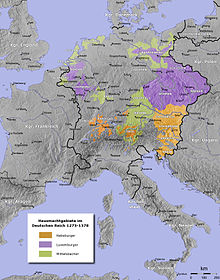Power politics
As house power politics refers to the pursuit of a noble family , his hereditary territorial possessions ( power base ) to zoom in and use these to achieve political goals.
Domestic power policy was of particular importance in the late medieval Holy Roman Empire . There, as a result of the so-called interregnum, there was a further weakening of the royal power, which was not very pronounced anyway, while the various sovereigns had a very strong position in their territories and were expanding them. The power of the electors , who had had the exclusive right to elect a king since the second half of the 13th century, also increased. The imperial property as the material basis of kingship dwindled in the 13th and 14th centuries. Century, while some powerful sovereigns tried to expand their influence on the imperial level. The influence of a noble family in the empire was now closely linked to the size of the domestic power. The most important thing was the pursuit of an intensive domestic power policy for the Roman-German kings, since a strong domestic power now represented an important basis for asserting one's own interests against the territorial princes. The power politics of competing aristocratic houses sometimes led to various armed conflicts.
A successful house power policy was among others by Emperor Charles IV from the House of Luxembourg and by Emperor Friedrich III. operated from the house of the Habsburgs . So Charles IV acquired the Upper Palatinate , Silesia , Lower Lusatia and the Mark Brandenburg , using imperial pledges. Friedrich III. gained by marrying his son with the daughter of Charles the Bold Burgundy and its neighboring countries, while Bohemia and Hungary fell to the Habsburgs in 1526 through the inheritance treaty concluded in 1491 . Friedrich - who withdrew completely from imperial politics - laid important foundations for the later Habsburg world power.
literature
- Michel Margue: The heir, the foreign prince and the estates. “International” marriages as a means of power politics in the field of tension between home power and country. In: Michel Pauly (Ed.): The heir, the foreign prince and the country. The marriage of John the Blind and Elizabeth of Bohemia in a comparative European perspective. CLUDEM, Luxembourg 2013, pp. 27–46.
- Malte Prietzel : The Holy Roman Empire in the late Middle Ages. Scientific Book Society, Darmstadt 2004, ISBN 3-534-15131-3 .
